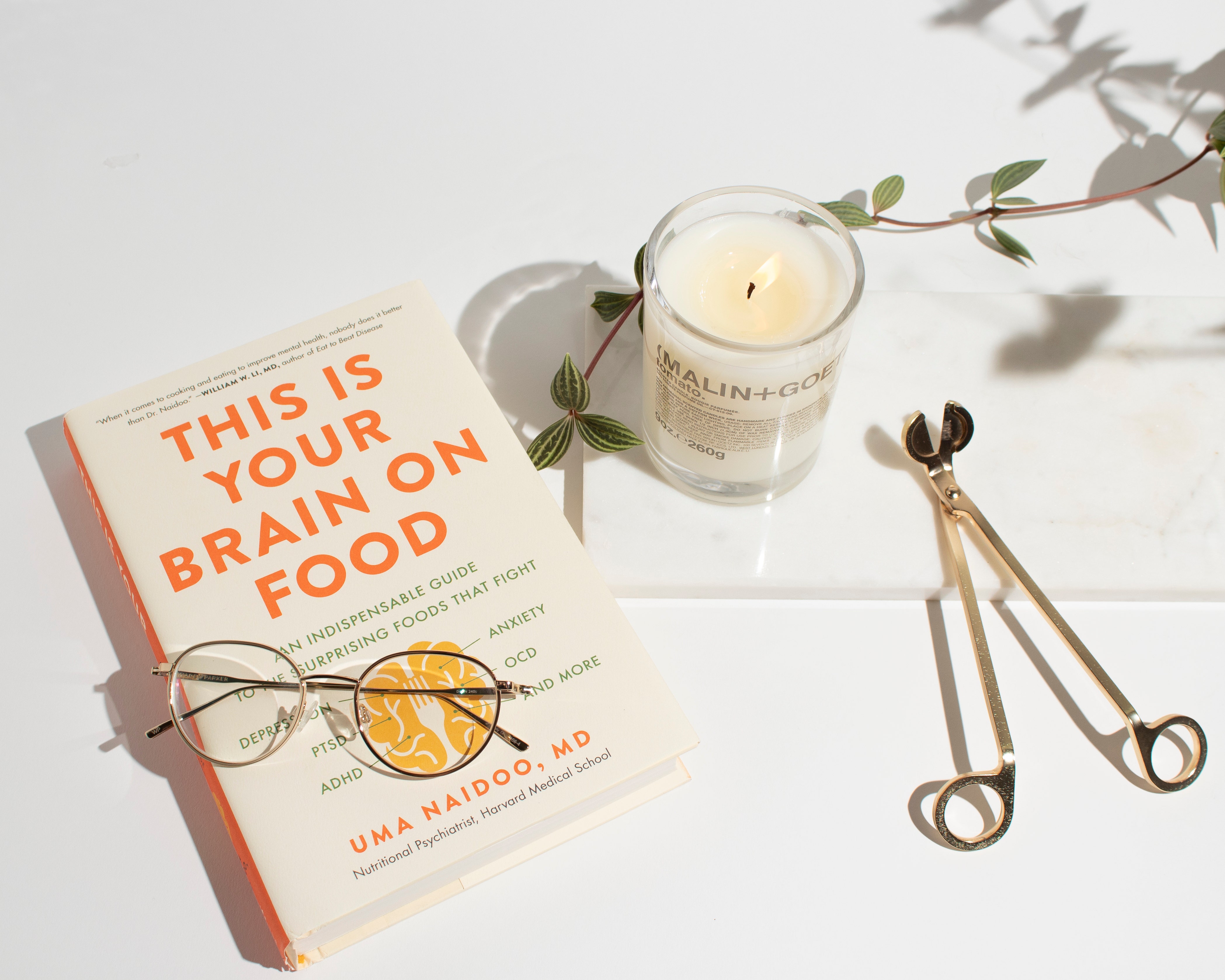Q+A with Dr. Uma Naidoo, nutritional psychiatrist
Verfasst: August 14, 2020
Kategorien: life+style.

When we’re in the city, during what we’d now call “normal” circumstances, we eat out almost every night. After a long day at the office, making dinner was just not a priority, especially with numerous good restaurants near our apartment. But since March we’ve been living upstate and, as you may have read in our previous posts, our garden is thriving and Andrew has been cooking almost every day. As a result we’ve become much more aware of what we eat and how it’s prepared; when the reality of how much salt, sugar and fat we were ingesting became clear – even though we both work out regularly and are in good health – it was pretty astounding. And we’ve noticed that since we took charge of our food, we feel a lot better.


This would not surprise our friend Dr. Uma Naidoo, the founder and director of the Nutritional & Lifestyle Psychiatry clinic at Boston’s Massachusetts General Hospital. For years she has included nutritional counseling in her sessions with patients and clients, specifically the relationship between how what they eat can affect how they feel, both physically and emotionally. Her book, This Is Your Brain On Food, debuted last week, and we feel her timing couldn’t be more perfect. With every day bringing new headlines of global malaise, we could all benefit from her knowledge about foods that that can help combat depression, anxiety and a host of other conditions. And as luck would have it, we’ve got some of those foods growing in our garden right now, and a limited edition candle inspired by one of them. Read on for an edited version of our conversation.
You’re considered a pioneer in the field of nutritional psychiatry, but before meeting you, we’d never heard of a nutritional psychiatrist. Can you explain what that is?
Being a nutritional psychiatrist describes the use of nutrition and nutrients to help someone with their mental health condition. I provide nutrition, lifestyle strategies, and a holistic integrated functional approach, that will help [my clients and patients] feel better, whether they take medication or use other strategies. They might not be on medication, they may just not be feeling good, or suddenly more anxious and stressed such as during a pandemic. In fact eating healthy options now can be a preventive measure we take to insure our better brain health and mental health moving forward. And a lot of that is related to the gut, which is really the center of where many of these changes start to happen.
When you say “gut,” you’re referring to….
It is an overall term I use for the stomach and small and large intestines, in other words the GI or gastrointestinal system (also containing cells, nerves, blood vessels and lymphatic tissue).
A lot of people might be surprised at how directly connected the gut is with the brain, given that they’re on relatively “opposite” ends of the body. How does it all relate?
Serotonin is what I like to call the “happiness hormone,” and more than 90% of the Serotonin receptors in our body are in the gut. One of the largest areas of our immune system is also in the gut, and the vagus nerve is a two-way super highway that connects the gut and the brain.
Your book mentions the microbiome or “environment” of the gut and how what we eat affects that system. What goes on there?
There are about 39 trillion “bugs” that live in our gut, and they can do a lot of good things, but they can also do bad things. If you eat healthy foods – fruits, vegetables, legumes, nuts, seeds, healthy whole grains – the “good” bugs will thrive and boost your immunity. If you eat processed foods – things with preservatives, stabilizers, added sodium and sugar – the “bad” bugs take over, and that is when disease can set in. Over time you may develop inflammation or “leaky gut,” which happens when so much is going wrong in your gut that it travels up to and affects the brain. So, what we eat becomes significantly important, because when you disrupt the balance of this system, it directly impacts your happiness hormone.
Covid 19 has obviously affected a lot of people, causing stress, anxiety and depression. What can they eat to help alleviate those conditions?
Omega 3 fatty acids from fatty seafood, like salmon, help both depression and anxiety. They target a lot of the mental health conditions because they reduce inflammation in the brain, and have an antioxidant effect on the brain. Antioxidants help our brain’s health by getting rid of negative substances that get formed in the body, so it’s good to add them in whenever we can.
There’s also a lot of evidence for eating blueberries to help with PTSD and trauma. Sources of Vitamin D are also good, as well as turmeric and black pepper, and fiber-rich foods like fruits, vegetables, beans, nuts legumes, seeds and healthy whole grains.
Phytonutrients are a large group of nutrients found in plant foods, and many of them are also antioxidants. The carotenoid that gives that beautiful orange color to your carrots, and the purple color you get in eggplants, or the color of blueberries. The nutrient gives them the color, so eat as many colors as you can. “Eat the rainbow is what I like to say”.
The other components I like to mention are the use of prebiotic and probiotic foods, and fiber-rich foods. Some prebiotic foods to add in are onions, garlics, leeks, chives, shallots and spring onions. They’re easy to include because we cook with them. Probiotic foods are things like yogurts with active cultures, or fermented foods like kimchi or kefir or pickled foods, but watch for salt content in those. Overall, they give your gut healthy bacteria.
This resonates for us as well, because so many of the ingredients you’re talking about – fatty acids, omegas, vitamin D – are in our skin care and create rich, healthful formulas for your skin.
Yes, and if you can eat these in a consistent way, like a consistent skin care regime, you actually should be ok. After all the largest organ of our body is our skin. What we eat matters on the outside as well as the inside for us to thrive.
Same in our world. If you’re washing your face and moisturizing it with effective products every day, you probably don’t need a treatment mask. The trick is to do it regularly. But people like shortcuts, or a quick fix. How do you feel about probiotic supplements?
I’m not against supplements, but I try to lead with food sources. My philosophy is “eat the orange, and skip the orange juice.” And also, studies have shown that when you make your meals at home, you eat fewer calories.
Speaking of making meals at home, we’re about to experience a tomato bounty -- last year our four plants produced over 200 tomatoes, and we introduced our tomato candle in time for peak tomato season, so tomatoes are top of mind right now. What are some of their benefits?
Tomatoes are very rich in antioxidants, specifically Lycopene. Lycopene has been shown to inhibit the growth of certain cancer cells, to fight against prostate cancer and have some positive properties in terms of cardiovascular health. And it turns out there’s even more Lycopene in the skin, so try to cook your tomatoes with the skin on.
We would’ve thought they’d be better for you raw.
The gentle heat helps release the Lycopene, making it more available to your body, and I have a super simple recipe for roasted tomatoes I can share with you.
Put tomatoes on a sheet pan that’s lined with parchment paper, sprinkle a little olive oil, salt and pepper, and you can even add your pre-biotics like sliced onions and garlic, and just roast them. These juicy tomatoes just burst, and you can use them as a chunky sauce for your whole grain pasta or even a to go with your brain-healthy salmon.
(Matthew) That sounds like something that I can make and I’m not a particularly good cook.
It’s probably too simple for Andrew, but it’s a way for people to start!
Don’t forget to shop Dr. Uma Naidoo’s new book here.

